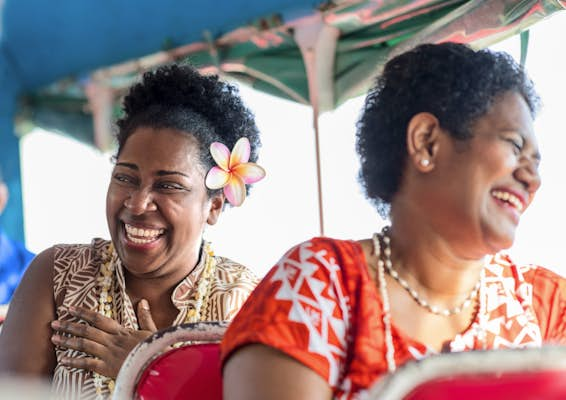Fijians are famous for their warm hospitality, which makes it easy to immerse yourself in their culture and make friends. From visiting villages and attending Sunday church services to playing rugby or sharing a traditional feast, here are the best ways to connect with the Fijian people and experience the islands like a local.

Visit a village
Village and community are everything in Fijian culture, with many Fijians still living in their traditional villages. A village visit is a unique and heartwarming experience, and the hallmark of a Fiji vacation, as it highlights the kindness, warmth and hospitality the locals are known for.
The staff at many resorts come from the local village, so your visit will not only offer you a chance to see the village’s school, church and community center, but also to meet the families of the people who have been looking after you. And of course, you’ll be welcomed to the village in true Fijian style with song and dance and kava, and perhaps even a lovo feast.
Your resort can help you organize a visit to a village and provide guidance on what to bring (sevusevu or gift for the chief) as well as what to wear (modest clothes).

Take part in a kava ceremony
Whether it’s part of a village visit, at your resort, or while shopping in Nadi, you’ll no doubt be offered the chance to try kava while in Fiji. Once reserved just for chiefs, today the kava bowl is a popular gathering place for family and friends to relax and chat and sing.
Made from the ground root of the yaqona plant, kava powder is mixed with water in a wooden bowl called a tanoa, around which you sit on the floor on a woven mat. The mixing of the kava involves traditional song and prayer and while the actual the drinking of the kava also involves some simple protocols, Fijians are always ready to help first-timers.
What does kava taste like? Earthy and organic are two popular adjectives. After a few bowls, you’ll start to feel relaxed, making kava a perfect after-dinner choice; at many resorts you can sit around a tanoa with the “bula band” and drink kava well into the night.

Join in song and dance
You cannot visit Fiji without noticing how music is interwoven into everyday life. Fijians love to sing and dance and visitors are always welcome, if not downright encouraged, to join in the fun.
Fijians love to share their music and there’s nothing like being greeted at your resort by the entire staff singing and clapping to the traditional ‘Bula Maleya’ song. During your stay, you’ll hear surrounding music throughout the day and into the evening, and be sure to attend a local church service to experience sublime a capella hymns. When you depart your resort, the sad sounds of the traditional farewell song ‘Isa Lei’ rarely leave a dry eye in the house as the staff serenade you farewell.
Fijians also love to share their history and lore through dance, called meke. Passed down over generations, these dances tell the stories of Fijian ancestors and their island home. You can catch a meke during a village visit or on Fiji Night at your resort; if your little ones spend time at a Kids’ Club they’ll likely come home with a few meke moves of their own.

Feast like a Fijian
As much as they love music, Fijians love to eat. With an abundance of fresh fish and seafood along with tropical fruits and native vegetables, there’s no shortage of delicious, fresh fare to be found. And with a savory twist provided by Fiji’s Indian and Chinese immigrants, it’s no wonder Fijian food is so flavorful and varied.
Traditional Fijian feasts – called lovos – have been enjoyed in the islands for centuries and involve the cooking of the meal in a large pit, covered in hot stones and banana leaves. Ingredients can vary, but chickens, pigs and various root vegetables are all common. Often, a village visit will include a lovo meal and many resorts will host a weekly lovo where guests can help with the cooking process throughout the day.
Another fun way to experience Fiji’s cuisine is with a visit to a local market. Here you can experience the huge array of goods and interact with the local vendors.

Tackle some rugby
Ask any Fijian what brings the country together like nothing else, and they will undoubtably say it’s Rugby. When there is an important match being played, the country will come to a halt, and for a short while, everyone will gather around to watch the closest TV. Fijian rugby players are among the best in the world, winning Gold in the Men’s tournament of the 2020 Tokyo Olympics. The country minted a special $7 commemorative bill after the team’s gold in Rio, so another over-the-top celebration is surely in the works.
Everyone in Fiji plays rugby. After school, after work, on weekends, on the beach, in the parks. Children who might not have a ball handy will pick up an empty water bottle and use it to start an impromptu game. And even if you are not familiar with rugby and the rules, not to worry, just ask, and in no time you’ll be “sidestepping the defense and scoring tries.”
Head to Wailoaloa and Natadola beaches on Viti Levu, local favorites for some beach front games. Or for the serious at heart, try training like the Fijian Olympians by running the massive hills at the Sigatoka Sand Dunes.
